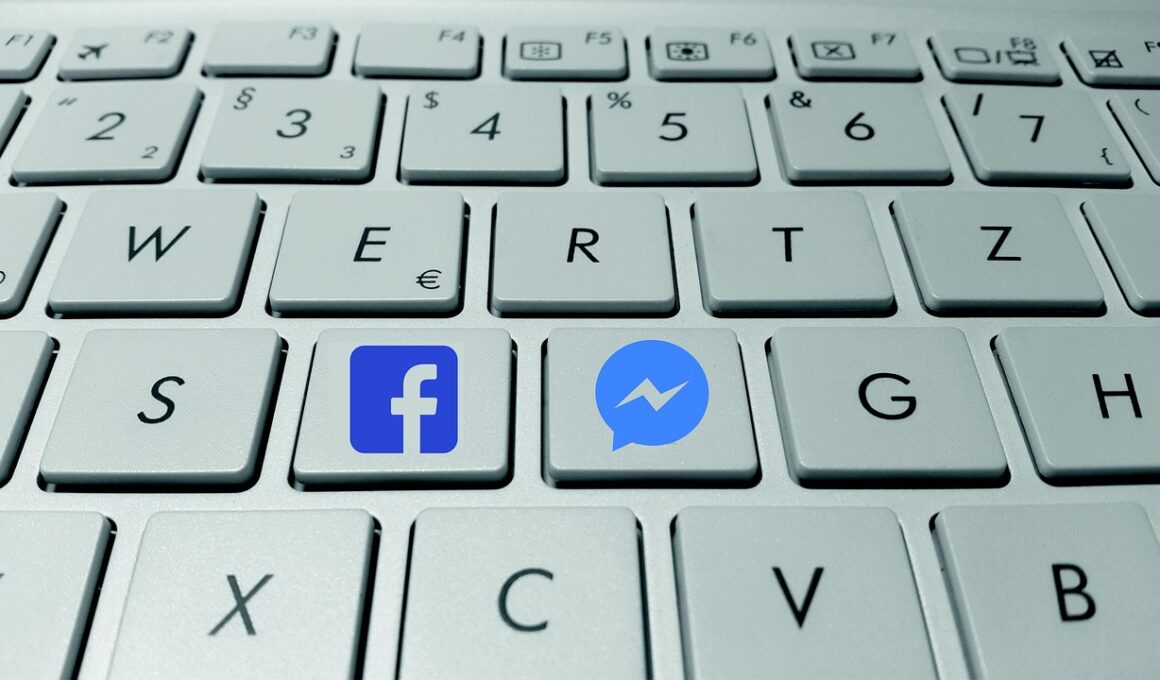Automating Sales through Facebook Messenger Marketing
In today’s digital landscape, businesses must adopt effective strategies to connect with potential customers. One compelling approach is utilizing Facebook Messenger for marketing opportunities. Messenger marketing allows brands to communicate directly with users through personalized messaging. This direct communication channel fosters relationships while enabling real-time engagement with customers. Automation is a key aspect of Facebook Messenger marketing, streamlining interactions and driving sales. By deploying chatbots, businesses can automate responses to frequently asked questions, providing instant support to users. Moreover, chatbots facilitate personalization, allowing businesses to tailor messages based on user preferences or behaviors. This heightened level of customer engagement can significantly influence purchasing decisions. In addition to enhancing customer service, Messenger marketing campaigns can also be crafted to highlight promotions and offers, nudging consumers towards a purchase. As more users opt for messaging over traditional email, it’s clear that utilizing Messenger can significantly enhance conversion rates. By integrating such strategies into marketing, companies can harness the power of automation to drive sales and growth, ultimately leading to greater overall success in their digital marketing efforts.
Messenger automation isn’t just about responding to questions; it can also drive lead generation. By using targeted ad campaigns that integrate with Messenger, businesses can capture leads more effectively. When a user clicks on an ad, they can instantly start a conversation. This seamless transition catches potential customers’ attention while providing valuable information tailored to their needs. Furthermore, integrating customer relationship management (CRM) systems with Messenger allows businesses to track interactions and follow up appropriately, ensuring leads do not slip through the cracks. Segmenting audiences through Messenger enables brands to run tailored campaigns. For instance, businesses can send reminders, updates, or follow-ups based on past interactions. Additionally, media such as images, videos, and engagement-based content can also be shared. This advancement fosters higher engagement, creating more dynamic conversations beyond textual exchanges. Moreover, insightful analytics can be gathered from Messenger interactions, allowing businesses to refine their marketing strategies over time. By analyzing response rates and customer behavior patterns, companies can enhance their targeting efforts and improve conversion rates, leading towards optimized campaigns that resonate with their audience.
Creating a sales funnel through Facebook Messenger is highly effective. To initiate this process, crafting a welcoming message is essential. The first interaction sets the tone for future conversations and can significantly affect customer interest. It should engage users while enticing them to explore more of what the business offers. Following up with engaging content, such as product highlights or user-oriented FAQs, fosters curiosity and encourages proactive responses. Segmenting potential customers based on their interests and previous interactions allows for a more personalized experience. For instance, if a user showed interest in specific products, businesses can send targeted offers related to those items. Moreover, the use of quick replies or buttons can make interactions seamless and user-friendly, simplifying the user experience dramatically. Automating occasion-based messages can remind users about promotions or new product launches, ensuring the brand remains on top of their minds. Overall, leveraging a structured sales funnel through Messenger creates opportunities for higher conversion rates, ensuring that customers feel valued while also enhancing the efficiency of business communications.
Enhancing Customer Engagement and Retention
Engaging customers through Messenger not only drives sales but also bolsters customer retention. Establishing ongoing communication fosters strong relationships between businesses and consumers. Regular updates on new products, exclusive offers, and personalized messages build loyalty over time. Businesses can also solicit feedback through Messenger, allowing customers to share their thoughts, enhancing customer satisfaction. This interactive approach illustrates that brands value customer opinions, further solidifying connections. Furthermore, Messenger can serve as a platform for special campaigns and contests, encouraging active participation from users. This engagement can create a community around the brand, amplifying its presence. In addition, sending A/B testing messages can refine marketing strategies, allowing businesses to determine which content resonates best with their audience. Consequently, effective customer engagement through Messenger translates into higher retention rates, ensuring a steady stream of repeat customers. By turning one-time buyers into loyal patrons, companies can generate more consistent revenue over time. Furthermore, retargeting users through personalized offers can drive purchases. Overall, enhancing customer engagement on Messenger leads to long-term relationships founded on trust and communication.
Utilizing analytics is essential for optimizing Messenger marketing strategies. Understanding user behavior and preferences helps businesses refine messaging and enhance response rates. Facebook provides valuable insights into message performance, including open and click-through rates. By analyzing these metrics, businesses can identify key areas for improvement, ensuring more effective campaigns in the future. Businesses should also test various messaging approaches. A/B testing allows organizations to explore different phrases, images, or designs, discerning which combinations yield the highest engagement. By continuously iterating on their strategies, companies can adapt to changing customer preferences and marketplace dynamics. Moreover, keeping an eye on industry trends is important. Observing how competitors utilize Messenger can provide valuable lessons and inspiration for new techniques. Exploring innovative methods, such as integrating interactive elements within conversations, can further enhance user engagement. It’s vital that businesses position themselves as industry leaders, always staying ahead of trends and consumer needs. Ultimately, leveraging analytics and refined strategies, businesses can create a dynamic Messenger marketing approach that aligns with their audience’s expectations, ensuring ongoing customer satisfaction and loyalty.
Moreover, integrating Facebook Messenger with other marketing channels amplifies reach and effectiveness. Coordinating campaigns across platforms like email, social media, and website can create a cohesive brand presence. Utilizing captured leads from Messenger interactions to feed into these other channels can offer comprehensive insights. For example, during email campaigns, businesses can highlight engagement on Messenger, driving users back to the platform for personalized follow-ups. Such cross-channel marketing reinforces brand messages and builds familiarity among customers. Additionally, ensuring that messaging aligns with other content ensures continuity across customer interactions. By harmonizing voice and tone across communication, businesses can cultivate a strong brand identity. Campaigns leveraging Messenger as a primary tool can be boosted with engaging posts across Facebook and Instagram, generating interest and excitement about unique offers. Users who engage through social interactions may be more likely to respond positively to Messenger communications, leading to higher conversion rates. Overall, this synergy among marketing channels broadens outreach and enhances the overall effectiveness of marketing strategies, ensuring a multifaceted approach to customer engagement and retention.
Future of Facebook Messenger Marketing
Looking ahead, the future of Facebook Messenger marketing thrives on innovation and adaptation. As user preferences continue to shift, businesses must remain agile in embracing new tools and features. Continuous advancements in artificial intelligence will enhance the capabilities of Messenger bots, making them increasingly sophisticated. Brands can expect improved personalization features that cater to individual customer journeys. Moreover, the growing popularity of video and interactive content will change the landscape of Messenger marketing. Businesses should leverage these trends to create more immersive experiences for their customers. With evolving technological capabilities, integrating augmented reality and machine learning can become viable, providing richer interactions. In addition, privacy considerations will play a vital role in shaping marketing strategies. Companies will need to prioritize transparency and trust in their messaging practices. As consumers become more aware of data privacy, ensuring secure and respectful interactions will be crucial. Looking towards the future, the businesses that effectively combine innovative technological advancements with a strong focus on customer relationships will dominate the market. Ultimately, creating meaningful connections while staying ahead of trends will define successful Facebook Messenger marketing strategies.
Enhancing Customer Engagement and Retention
Engaging customers through Messenger not only drives sales but also bolsters customer retention. Establishing ongoing communication fosters strong relationships between businesses and consumers. Regular updates on new products, exclusive offers, and personalized messages build loyalty over time. Businesses can also solicit feedback through Messenger, allowing customers to share their thoughts, enhancing customer satisfaction. This interactive approach illustrates that brands value customer opinions, further solidifying connections. Furthermore, Messenger can serve as a platform for special campaigns and contests, encouraging active participation from users. This engagement can create a community around the brand, amplifying its presence. In addition, sending A/B testing messages can refine marketing strategies, allowing businesses to determine which content resonates best with their audience. Consequently, effective customer engagement through Messenger translates into higher retention rates, ensuring a steady stream of repeat customers. By turning one-time buyers into loyal patrons, companies can generate more consistent revenue over time. Furthermore, retargeting users through personalized offers can drive purchases. Overall, enhancing customer engagement on Messenger leads to long-term relationships founded on trust and communication.


